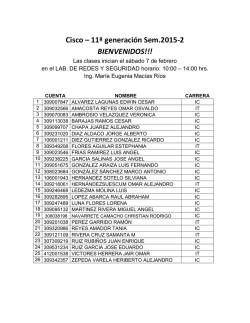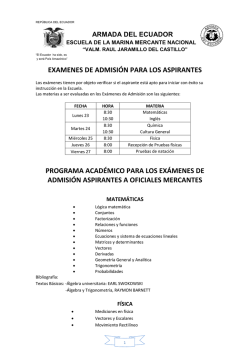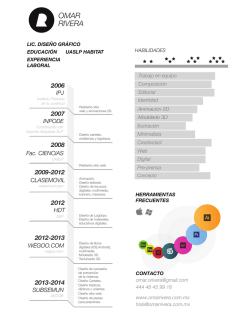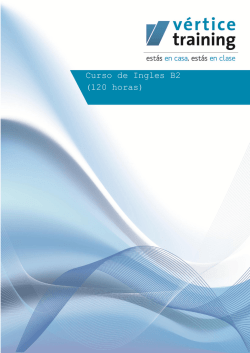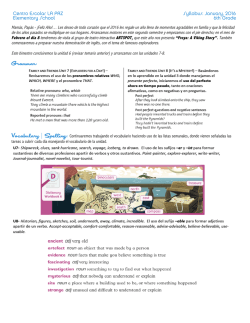
SPN IIA practice for Test over lección 8
SPANISH IIA Practice for lección 8 test Nombre ESCUCHAR Listen as a waiter describes the menu, then answer multiple choice questions. (10 pts—2 pts per question) STUDY: LECCIÓN 8 VOCABULARY LEER Read an article and answer the multiple choice questions. (10 pts—2 pts per question) STUDY: LECCIÓN 8 VOCABULARY ESCRIBIR Describe what happened at dinner last night. Use the preterite and at least one comparison word/phrase. Challenge = include direct and indirect object pronouns. Rubric total will be divided by 3 for a possible maximum of 10 points. Rubric is on the next page. Practice writing your essay here: ANSWER KEY: 1. sirvió 2. siguieron 3. se sintieron 4. se despidieron 5. volvieron 6. me lo 7. telas 8. Se la 9. nos la 10. más 11. menos 12. peor 13. menor 14. G 15. E 16. A WRITING RUBRIC CONTENT 6 Complete: Main idea is clear, supporting details are provided, the writer exceeds teacher expectations. 5 Complete: Main idea is clear, details are provided, requirements are met. 4 Generally complete: Main idea is conveyed, a few details are provided, minimum requirements are met. 3 Somewhat incomplete: Main idea is unclear. Some details aren’t relevant. All requirements may not be met. 2 Incomplete: Main idea is unclear. Details are irrelevant or nonexistent. Minimum requirements are not fulfilled. COMPREHENSIBILITY 6 Very comprehensible: All ideas are clearly conveyed with appropriate language. No noticeable interference from English. 5 Comprehensible: All ideas are clearly conveyed. Little, if any, interference from English. 4 Generally comprehensible: Most ideas are clearly conveyed. The message is unclear in a few places. 3 Somewhat incomprehensible: Some of the language is inappropriate or distorted by English. The message could only be understood by a sympathetic native speaker. 2 Incomprehensible: Most or all ideas are unclear. Major interference from English distorts the writing. VOCABULARY USAGE 6 Excellent: Specific, appropriate vocabulary is used correctly throughout the writing sample. Spelling is correct. 5 Good: Vocabulary is used correctly throughout the writing sample. Spelling is mostly correct. 4 Fair: Some mistakes in vocabulary use. Minor problems with spelling. 3 Poor: Vocabulary problems distort meaning. Frequent spelling errors. 2 Unacceptable: Communication is completely inhibited by vocabulary errors. Mistakes in spelling make the sample incomprehensible. ORGANIZATION 6 Well organized: The order and format are logical and help to convey the ideas. Sequencing words have been used effectively. 5 Organized: Ideas are ordered logically. Sequencing words may be used to help with presentation. 4 Generally organized: Any sequencing problems are minor. 3 Somewhat disorganized: Order is illogical and confusing in places. Sequencing words may be used incorrectly or not present. 2 Disorganized: Presentation completely obscures the main idea. The writing lacks order. ACCURACY 6 Excellent: Grammar is used correctly throughout the writing sample. Punctuation is correct. 5 Good: Grammar errors are minor and do not distort meaning. Punctuation is mostly correct. 4 Fair: A few grammar errors that may inhibit communication. Minor problems with punctuation. 3 Poor: Grammar problems distort meaning. Frequent mistakes in punctuation disrupt the flow. 2 Unacceptable: Communication is completely inhibited by grammatical errors. Mistakes make the sample incomprehensible. GRAMÁTICA preterite of stem-changing verbs: Una cita (a date) Fill in the blanks in this paragraph with the preterite form of the stem-changing verbs in parentheses. (1 pt per blank) Paula y Federico fueron al restaurante en su primera cita. La camarera les (1) _________________ (servir) comida deliciosa. Ellos lo pasaron muy bien. Después de comer, ellos (2) __________________ (seguir) hablando por una hora. Los dos (3) (sentirse) muy bien. Paula y Federico (4) (despedirse) a las doce de la noche, pero (5) (volver) a verse pronto. double object pronouns Fill in the blanks with the correct object pronouns. (1 pt per blank) 6. ¿Vas a servir el café a mí? = ¿ vas a servir a mí? 7. Van a traer las papas fritas a ti. = Van a traér a ti. 8. Pedimos una sopa de mariscos para ellos. = pedimos para ellos. 9. La maestra va a repetir la respuesta a nosotros. = La maestra va a repetir. comparisons Francisco and Omar are very different. Complete the comparisons with the correct words from the word box. (1 pt per blank) más mayor mejor menor menos 10. Omar no es bajo. Francisco es bajo. Omar es peor que alto que Francisco. 11. Francisco tiene muchos libros, pero Omar sólo tiene cinco. Omar tiene libros que Francisco. 12. Omar estudia todos los días, pero Francisco nunca estudia. Francisco es estudiante que Omar. 13. Omar tiene quince años, y Franciso tiene catorce. Francisco es que Omar. superlatives Match the sentence pairs. (1 pt per question) 14. Carmen no tiene tiempo de leer este libro. 15. No me gusta ese almacén. 16. No tengo mucho dinero; voy a comprar esa camisa en rebaja. A. Es baratísima. B. Son las más aburridas. C. Es la mayor. D. Son feísimos. E. Es el peor de la ciudad. F. Son los menos sabrosos. G. Es larguísimo.
© Copyright 2026
